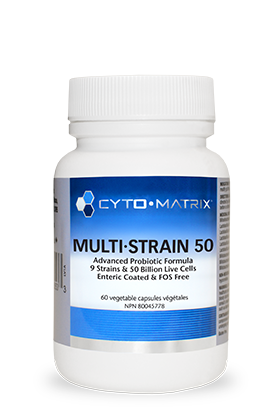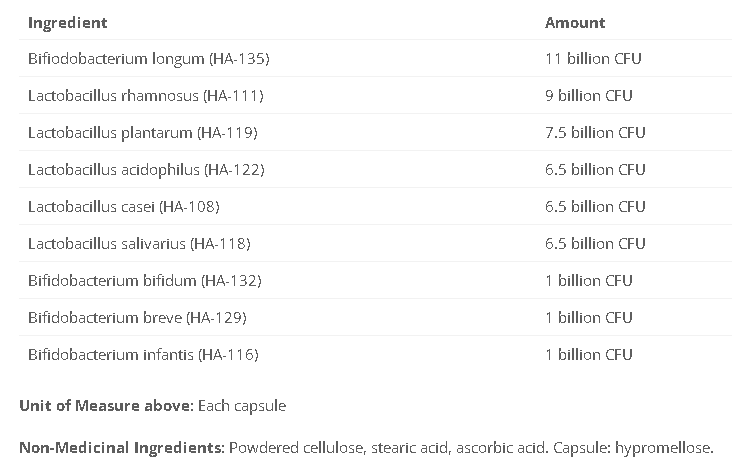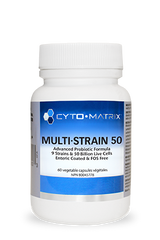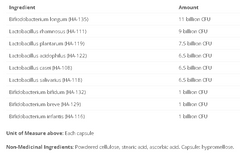



Multi-Strain 50
- 75.99$
0.00$- 75.99$
- Unit price
- per
Description
x- Guaranteed 50 billion colony-forming units with a combination of 9 carefully selected lactobacilli and bifidobacteria strains per vegetable capsule
- Indicated for the rapid restoration and healthy recolonization of gastrointestinal microflora during periods of acute stress such as antibiotics, infections or intestinal inflammatory flare-ups.
- The enteric-coated vegetable capsule ensures that each probiotic strain survives the harsh acidic environment of the stomach for delivery into the digestive tract.
- Free of fructo-oligosaccharides (FOS) to prevent worsening of gastrointestinal symptoms such as flatulence and bloating in sensitive individuals
- FODMAP friendly
The 21st century has seen a revolution in the way we think about bacteria. We now understand that gut microflora dictates many aspects of our health, from digestive regularity and metabolic function to mental health. At the same time, we realize that our microbiome is affected by changes in the external environment such as diet, geography, stress response, and many types of medications.
While new and exciting research on the topic is ongoing, one thing is certain: supporting a healthy microbiome is critically important for optimal human health. A well-formulated probiotic is just one piece of the puzzle in restoring and balancing a disrupted microbiome.
What constitutes a healthy microbiome? Although there are hundreds of bacterial species that inhabit the digestive tract, there are two dominant species of bacteria in humans. The most abundant species in humans are the Lactobacillus and Bifidobacteria families.
Bifidobacteria are known to be important in providing a protective barrier to infection. Additionally, bifidobacteria produce an antimicrobial substance that acts against pathogenic bacteria and may have immunomodulatory properties by stimulating humoral immune cells.
Lactobacilli is another important indicator of healthy microflora in the human gastrointestinal and genitourinary tracts. For patients with disturbed microflora, Lactobacilli is therapeutically important for rapid recolonization of the gastrointestinal and genitourinary tracts, thereby preventing harmful colonization by pathogenic bacteria. They are also therapeutically important for decreasing intestinal permeability and aiding in nutrient absorption.
Specific strains of lactobacilli and bifidobacteria have been studied for their ability to improve gastrointestinal health during acute periods of stress. For example, Lactobacillus rhamnosus has been extensively studied for the improvement of acute diarrhea in children and travelers' diarrhea, while numerous studies have supported the use of probiotics to reduce the frequency of antibiotic-associated diarrhea. Additionally, there is significant clinical application of probiotics for inflammatory bowel disease. Clinical trials have used a combination of lactobacilli and bifidobacteria to prevent relapse and colonization of harmful bacteria in patients with ulcerative colitis.
Multi-Strain 50 is Cyto-Matrix's high-potency probiotic containing 9 different strains and a guaranteed 50 billion colony-forming units (CFU) per vegetarian capsule. The high dose and carefully selected lactobacilli and bifidobacteria strains in Multi-Strain 50 enable rapid restoration and healthy recolonization of the gastrointestinal microflora during periods of acute stress such as antibiotics, infections, or inflammatory bowel flare-ups.
Multi-Strain 50 has been formulated with an enteric-coated vegetable capsule to ensure each probiotic strain survives the harsh acidic environment of the stomach. Multi-Strain 50 is also completely free of fructooligosaccharides (FOS). FOS is typically added to probiotic supplements as a prebiotic, but many patients report worsening gastrointestinal symptoms such as flatulence and bloating. Because Multi-Strain 50 is FOS-free, this product is also safe for use by those on a low-FODMAP diet.
Produits recommandés
Produits récemment consultés
- Choosing a selection results in a full page refresh.



